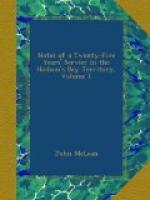“Tuesday, the 6th.—Left our encampment at seven. Our guide lost his way about noon, which after an hour’s search, he succeeded in finding; when we resumed our slow march, Pellican proceeding at a snail’s pace, which neither threats nor entreaties could in the least accelerate. Encamped at five, P.M. Eleven miles.
“Wednesday, the 7th.—Started at half-past six, A.M. Arrived at the site of an extensive Indian camp, which appeared to have been recently occupied. Our guides knowing the Indians to be their friends from Ungava, and their trail leading in the direction of our route, required no longer to be urged on. An immediate impulse was given to Pellican’s sluggish motions, increasing his speed to such a degree, that it required our utmost exertions to keep up with him. Encamped near a high fall on North-West River, which is here walled in by inaccessible precipices on both sides. The view above the fall is interrupted by stupendous rocks; the natives say that the appearance of the river and surrounding country is the same from this fall to Michigama Lake; the river is deemed to be impracticable for any kind of craft. Eighteen miles.
“Thursday, the 8th.—Set off at seven, A.M. Fine travelling on the river. We passed two portages and rapids. Encamped at forty-five minutes past five. Twenty miles.
“Friday, the 9th.—Decamped at seven. Travelling good; the banks of the river high and precipitous, and almost destitute of wood. We observed, however, a few birches. Encamped at six, P.M. Twenty miles.
“Saturday, the 10th.—Started at eight, A.M. About noon we arrived at a wide expansion of the river, where it suddenly bends to the west. Here we again quitted the river, directing our course to the eastward. The navigation of this part of the river is represented by the natives to be impracticable, and similar to the upper part. Our snow-shoes being the worse for wear, we encamped at an early hour for the purpose of repairing them. Advanced fifteen miles.
“Sunday, the 11th.—Decamped at seven, A.M. Pursued our course through the roughest country I ever travelled. The appearance of it struck me as resembling the ocean when agitated by a storm, supposing its billows transformed into solid rock. We commenced ascending and descending in the morning, and kept at it till night. The men complained much of fatigue. Proceeded fourteen miles.
“Monday, the 12th.—The weather being so much overcast that we could not find our way, we remained in our encampment till eight, A.M. Encamped at a quarter past five. Fifteen miles.
“Tuesday, the 13th.—Set off at half-past seven, amidst a tremendous snow-storm, which continued without intermission the whole day; we sunk knee-deep in the snow, and found it not the most pleasant recreation in the world. About noon we passed a hut, which my guide told me had been the residence of a trader, two years ago. Late in the evening we arrived at another hut, on North West River, where we found two of Mr. McGillivray’s people, who were stationed there for the purpose of trapping martens. Nine miles.




